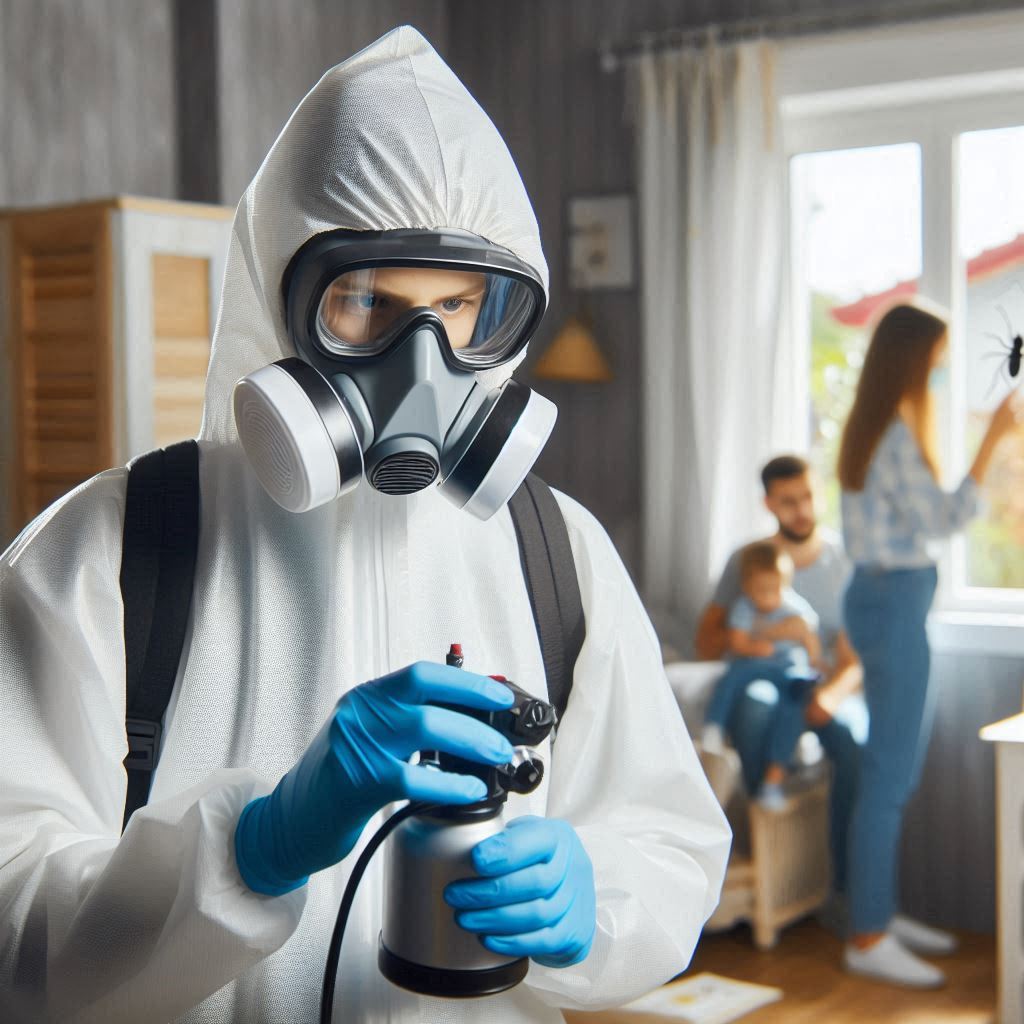Introduction
The pest control industry plays a vital role in public health and safety.
It focuses on managing pests that can harm humans, animals, and property.
This industry encompasses various services, including residential, commercial, and agricultural pest management.
Pest control professionals use chemical, biological, and physical methods to combat infestations.
However, the COVID-19 pandemic significantly affected this industry.
Initially, lockdown measures led to a sharp decline in demand for pest control services.
Businesses and homes reduced pest treatments as they focused on immediate health concerns.
Consequently, many pest control companies faced financial difficulties and operational challenges.
As the pandemic progressed, the landscape shifted.
New challenges emerged, such as changing customer needs and increased competition.
Additionally, pest control professionals had to adapt to enhanced safety protocols.
These included personal protective equipment (PPE) and social distancing measures during service calls.
In this blog, we will explore the multifaceted impact of COVID-19 on the pest control industry.
We will discuss the shifts in demand for services, the operational adjustments companies made, and the long-term implications for the industry.
Understanding these changes is crucial for stakeholders aiming to navigate this evolving landscape successfully.
Changes in Demand for Services
The COVID-19 pandemic has significantly altered the demand for pest control services.
Decrease in Commercial Pest Control Services Due to Temporary Closures
Commercial pest control services experienced a notable decline due to temporary business closures.
As businesses shut down or reduced operations, pest control companies lost substantial contracts.
This downturn particularly affected restaurants, hotels, and office spaces, which typically require regular pest management.
Increase in Residential Pest Control Services as People Spend More Time at Home
Conversely, the demand for residential pest control services surged as people stayed home.
Homeowners became more vigilant about pest issues during lockdowns.
Increased time spent indoors led many individuals to notice pests more than ever before.
As a result, pest control companies reported a rise in requests for residential services.
Families began prioritizing their home environments, emphasizing the importance of pest-free living spaces.
With children and pets at home, homeowners recognized the need for effective pest management.
This shift prompted many pest control providers to adapt their offerings to meet new residential needs.
Shift in Focus Towards Preventative Measures and Outdoor Pest Control
In addition to an increased demand for residential services, pest control companies also shifted their focus.
The emphasis moved toward preventative measures rather than reactive treatments.
Homeowners wanted to avoid infestations before they occurred.
As a result, pest control providers began promoting routine inspections and treatments.
Outdoor pest control also gained traction as people sought to enjoy their backyards.
Many families turned to outdoor activities as a safe way to socialize.
This shift led to a growing need for pest management solutions in gardens and yards.
Pest control companies responded by offering treatments tailored to outdoor spaces.
This new focus on outdoor pest control highlighted the importance of maintaining a pest-free environment for family gatherings.
Customers began requesting treatments that targeted common outdoor pests, such as mosquitoes and ticks.
Pest control providers expanded their service offerings to include these outdoor solutions.
Additionally, the pandemic influenced consumer preferences in pest control service delivery.
Many homeowners now prefer contactless services.
This trend prompted pest control companies to adapt their operations and enhance safety measures.
Companies implemented protocols for social distancing and sanitation during treatments.
These adaptations not only ensured customer safety but also maintained trust and confidence in pest management services.
Overall, the pandemic reshaped the pest control industry significantly.
The decrease in commercial services coincided with a boom in residential demand.
The focus on preventative measures and outdoor treatments reflects the changing landscape of pest control.
Pest control companies that embraced these changes thrived, adapting to new consumer behaviors.
They recognized the importance of flexibility and innovation in navigating the post-COVID landscape.
Moving forward, the pest control industry will continue to evolve in response to shifting demands and preferences.
Read: Steps to Become a Professional Pet Groomer in the USA
Supply Chain Disruptions
The COVID-19 pandemic significantly disrupted supply chains across various industries, including pest control.
Many pest control companies faced shortages of essential products and equipment.
These shortages stemmed from factory shutdowns and reduced production capacity due to health restrictions.
As a result, companies struggled to source the materials they needed to operate effectively.
Shortages of Essential Pest Control Products and Equipment
The delays in shipments from suppliers added to the challenges.
Transportation restrictions hampered the movement of goods, causing delays in receiving essential supplies.
Pest control operators often experienced extended waiting periods for products, which impeded their ability to serve customers promptly.
These delays also created uncertainty, making it difficult for businesses to plan their operations.
Delayed Shipments from Suppliers
Increased costs for supplies have further strained profit margins.
With shortages prevalent, many suppliers raised their prices.
Pest control companies found themselves paying more for the same products they previously purchased at lower prices.
This rise in expenses created a dilemma for many businesses, as they had to decide whether to absorb the costs or pass them on to customers.
The increased cost of supplies forced many pest control operators to rethink their pricing strategies.
Some businesses opted to raise their rates to maintain profitability.
Others absorbed the costs to retain customers during tough economic times.
This balancing act required careful consideration and communication with clients.
Increased Cost of Supplies Impacting Profit Margins
In addition to higher prices, the availability of critical equipment became a significant issue.
For example, personal protective equipment (PPE) for technicians was often in short supply.
Many pest control companies had to implement safety measures while ensuring their staff had adequate protection.
This necessity added to operational costs, further affecting the bottom line.
The impact of supply chain disruptions is not limited to costs.
Delays in obtaining products also affected service delivery times.
Customers experienced longer wait times for pest control services, leading to dissatisfaction.
In some cases, businesses lost customers due to prolonged service interruptions.
The challenges created by supply chain disruptions highlighted the importance of resilience in the pest control industry.
Companies began seeking alternative suppliers and diversifying their product sources.
This strategic shift aimed to mitigate risks associated with future disruptions.
Moreover, businesses adapted their inventory management practices.
By closely monitoring stock levels and anticipating demand, pest control companies aimed to reduce the impact of shortages.
These proactive measures will help organizations better navigate supply chain challenges moving forward.
In review, supply chain disruptions significantly impacted the pest control industry during the pandemic.
Shortages, delayed shipments, and increased costs created numerous challenges.
As companies adapt, they must focus on resilience and strategic planning to thrive in a post-COVID-19 landscape.
Read: Essential Skills Every Pet Groomer Should Have
Safety Regulations and Guidelines
The COVID-19 pandemic forced the pest control industry to adapt quickly to new safety regulations and guidelines.
Technicians faced unique challenges while ensuring customer safety and maintaining service quality.
Implementation of new safety measures became crucial for protecting both staff and clients.
Implementation of New Safety Measures for Pest Control Technicians
Pest control companies introduced rigorous personal protective equipment (PPE) requirements.
Technicians now wear masks, gloves, and face shields during every service.
These measures significantly reduce the risk of virus transmission between technicians and clients.
Moreover, companies train their staff on proper PPE usage and disposal.
This training ensures that every technician understands how to protect themselves and others effectively.
PPE Requirements and Additional Sanitization Protocols
In addition to PPE, pest control companies adopted additional sanitization protocols.
Technicians now disinfect equipment and vehicles frequently.
Before and after each job, they sanitize tools, vehicles, and surfaces to minimize contamination risks.
These actions reassure customers that their health and safety are top priorities.
Companies also developed specific protocols for service appointments.
Technicians conduct remote assessments when possible, utilizing virtual consultations to limit in-person interactions.
This approach allows for detailed evaluations without compromising safety.
Adapting to Social Distancing Guidelines While Providing Services
When in-person visits are necessary, companies enforce strict sanitization and social distancing measures.
Technicians communicate with clients from a safe distance, explaining procedures and gathering information without close contact.
This practice protects both parties while ensuring effective communication.
Furthermore, companies emphasized the importance of scheduling flexibility.
Technicians now offer services at various times to reduce crowding.
They spread out appointments to minimize the number of people present at a given time.
This adjustment ensures safety while improving customer satisfaction by accommodating individual needs.
The pest control industry also increased communication with clients regarding safety measures.
Companies inform clients about the precautions being taken to protect their health.
This transparency builds trust and reassures customers that their safety is a priority.
In essence, the impact of COVID-19 on the pest control industry led to significant changes in safety regulations and guidelines.
The implementation of new safety measures, including PPE requirements and additional sanitization protocols, became essential.
Technicians adapted to social distancing guidelines while delivering services effectively.
As the industry continues to navigate these challenges, the emphasis on safety will remain a key focus, ensuring the well-being of both technicians and clients.
Read: How to Handle Emergency Situations in Pet Grooming

Impact on Small Businesses
Struggles for Small Pest Control Companies to Stay Afloat
The COVID-19 pandemic significantly affected small businesses, including pest control companies.
Many small pest control firms struggled to stay afloat during this crisis.
With health concerns rising, customers hesitated to schedule pest control services.
As a result, numerous companies faced substantial revenue losses.
Cancellations of services became commonplace.
Clients postponed routine pest control visits, fearing potential exposure to the virus.
Some businesses reported a staggering decline in demand for their services.
This unexpected downturn forced many small companies to adapt quickly.
They implemented health and safety protocols to reassure customers.
Despite their best efforts, many small pest control businesses struggled financially.
Revenue losses from canceled services created a ripple effect.
Companies found it challenging to meet their fixed costs, such as rent and salaries.
Consequently, some firms were forced to lay off employees.
Others had to reduce working hours, leading to further financial strain.
Loss of Revenue from Canceled Services and Contracts
Small pest control companies also faced challenges in securing new contracts.
With businesses and homes shutting down, the demand for pest control services decreased.
Property managers and landlords postponed pest control projects to save costs.
The need for pest control remained, but many clients prioritized essential services.
The cancellations resulted in a significant loss of revenue for many firms.
Business owners often struggled to forecast their financial stability.
They had relied on steady income from routine services and contracts.
The sudden drop in revenue led to increased anxiety among small business owners.
They worried about their ability to pay bills and retain employees.
Need for Government Assistance and Financial Support
Government assistance became critical for small pest control companies.
Many owners sought financial aid to navigate the crisis.
However, securing these funds proved difficult for some businesses.
The application processes were often lengthy and complicated.
Many small companies lacked the resources to complete these applications effectively.
Furthermore, not all small pest control businesses received the assistance they needed.
Many owners reported feeling overlooked in the government’s relief efforts.
The financial support available often favored larger businesses with more visibility.
This lack of support left some small firms struggling to survive.
To cope with the challenges, small pest control companies turned to innovation.
Many enhanced their marketing efforts to reach potential customers.
They utilized social media and online platforms to promote their services.
Virtual consultations and contactless service options became popular as well.
These adaptations helped some businesses regain lost revenue.
The pandemic highlighted the vulnerability of small businesses.
It emphasized the need for ongoing support to help them recover.
Financial assistance and policy changes could foster resilience in the pest control industry.
As the world adapts to a post-COVID-19 landscape, small pest control companies must prioritize their survival strategies.
Read: How Much Do Pet Groomers Earn in the USA?
Transform Your Career Today
Unlock a personalized career strategy that drives real results. Get tailored advice and a roadmap designed just for you.
Start NowTechnological Innovations in Pest Control
The COVID-19 pandemic forced many industries to adapt quickly.
The pest control industry was no exception.
Technological innovations emerged as critical solutions to maintain operations while ensuring safety.
Here, we explore three key technological advancements: contactless pest control services, virtual consultations, and digital platforms for scheduling and payments.
Adoption of Contactless Pest Control Services
The demand for contactless services skyrocketed during the pandemic.
Pest control companies quickly pivoted to adopt contactless methods.
Technicians began using innovative tools that allowed them to treat infestations without direct interaction.
They utilized specialized equipment to apply pesticides from a safe distance.
This approach enhanced safety for both customers and technicians.
Many companies reported increased customer satisfaction due to the convenience of these services.
Clients appreciated the reduced need for physical contact while addressing pest issues.
Consequently, contactless pest control services became a new standard in the industry.
Increased Use of Virtual Consultations and Remote Monitoring
Virtual consultations gained popularity as a safe alternative to in-person meetings.
Pest control companies began offering video consultations to assess infestations.
This allowed technicians to provide immediate feedback without visiting the site.
Customers could easily show their pest problems through their devices.
These consultations became valuable tools for initial assessments.
Remote monitoring technology also became more prevalent during the pandemic.
Companies equipped their clients with monitoring devices that tracked pest activity.
This technology provided real-time data on infestations.
It empowered customers to manage pest issues proactively.
Virtual consultations and remote monitoring significantly streamlined the pest control process.
Integration of Digital Platforms for Scheduling and Payments
The need for digital solutions became apparent during the pandemic.
Pest control companies increasingly integrated digital platforms for scheduling and payments.
Customers can now book services online, eliminating the need for phone calls.
This convenience simplifies the process for both clients and companies.
Digital payment options also gained traction, allowing secure transactions without physical cash.
This shift to digital platforms enhances the customer experience.
Clients enjoy the ease of managing their pest control needs from home.
Many companies reported that these digital solutions improved operational efficiency as well.
In fact, technological innovations have transformed the pest control industry during the COVID-19 pandemic.
The adoption of contactless pest control services, increased use of virtual consultations, and integration of digital platforms have reshaped operations.
These advancements ensure safety while maintaining high service standards.
As the industry continues to evolve, these technologies will likely remain integral to pest control services.
The lessons learned during this time will drive further innovations and improvements in the years to come.
Adapting to these changes will help pest control companies thrive in an increasingly digital world.
Learn More: Best Apps for Taxi and Rideshare Drivers in 2024
Delve into the Subject: Navigating Routes: Tools and Techniques for Bus Drivers
Training and Education
The COVID-19 pandemic significantly transformed training and education in the pest control industry.
With in-person gatherings restricted, companies pivoted to online training programs.
This shift allowed pest control professionals to continue their education while adhering to safety protocols.
Virtual platforms became essential for delivering training modules, webinars, and interactive sessions.
Shift Towards Online Training Programs for Pest Control Professionals
Online training programs offer flexibility for busy professionals.
They can access resources at their convenience, enhancing learning opportunities.
These programs cover various topics, including pest identification, treatment techniques, and integrated pest management strategies.
They also provide essential knowledge about the latest pest control technologies and products.
New Safety Protocols and Guidelines
As the industry adapts, new safety protocols and guidelines have emerged.
Companies now emphasize the importance of following these updated practices.
Training sessions include comprehensive safety training focused on COVID-19 precautions.
This training educates technicians on proper hygiene practices, personal protective equipment (PPE), and sanitation measures.
Adopting these safety measures helps protect employees and clients, ensuring trust in pest control services.
Opportunities for Continuing Education and Certification in the Pest Control Industry
Continuing education opportunities have expanded in the pest control sector.
Organizations now offer specialized courses and certifications to enhance professional skills.
These certifications can significantly boost a technician’s credentials, improving their career prospects.
Many states require continuing education credits to maintain licensing.
Therefore, engaging in these programs ensures compliance with local regulations.
Online platforms have made continuing education more accessible.
Professionals can now participate in live webinars and recorded sessions from anywhere.
This accessibility encourages more technicians to pursue further education.
Online courses also provide interactive components, such as quizzes and discussion forums, enhancing the learning experience.
In addition to safety protocols, training programs address emerging pest issues.
Technicians learn how to respond to new pest trends influenced by climate change and urbanization.
They receive guidance on adapting their strategies to effectively manage these challenges.
This proactive approach equips pest control professionals with the tools needed for success.
The shift towards online training has made networking more vital than ever.
Virtual conferences and seminars provide opportunities for professionals to connect.
They can share experiences and insights, fostering collaboration within the industry.
Networking helps technicians stay informed about best practices and industry developments.
The COVID-19 pandemic reshaped training and education in the pest control industry.
The shift to online programs has made learning more flexible and accessible.
Emphasizing new safety protocols ensures the health and safety of professionals and clients.
Expanding continuing education opportunities allows technicians to enhance their skills and knowledge.
Ultimately, this transformation strengthens the pest control industry and prepares professionals for future challenges.
Gain More Insights: Essential Training for Front Desk Agents
Consumer Behavior Changes in the Pest Control Industry
Increased Awareness of Hygiene and Cleanliness at Home
The COVID-19 pandemic significantly altered consumer behavior, particularly regarding pest control services.
One notable shift is the increased awareness of hygiene and cleanliness at home.
Many homeowners now prioritize cleanliness as a crucial aspect of their daily lives.
This heightened awareness has prompted individuals to seek pest control solutions that align with their focus on hygiene.
Previously, many consumers viewed pest control as a routine task.
Now, they recognize its importance in maintaining a healthy living environment.
As a result, consumers are more inclined to research and invest in pest management solutions.
They understand that pests can pose health risks, making effective pest control essential.
This change in mindset drives demand for services that emphasize cleanliness and sanitation.
Demand for Eco-Friendly and Non-Toxic Pest Control Solutions
Alongside increased awareness of hygiene, there is a growing preference for eco-friendly and non-toxic pest control solutions.
Consumers are increasingly concerned about the impact of chemicals on their families and pets.
Many individuals now seek alternatives that are both effective and environmentally friendly.
They want to eliminate pests without compromising their health or the planet’s well-being.
This shift has led pest control companies to adapt their offerings.
Companies now focus on integrating eco-friendly products and practices into their services.
Offering non-toxic solutions helps attract environmentally conscious consumers.
As a result, pest control providers must stay updated on the latest eco-friendly practices and products.
Preference for Reputable and Trustworthy Pest Control Companies
Alongside these changes, consumers have developed a strong preference for reputable and trustworthy pest control companies.
With so many options available, homeowners prioritize companies with proven track records.
They look for businesses with positive customer reviews and testimonials.
Consumers want assurance that the pest control solutions provided are reliable and effective.
This demand for trust and transparency has increased the importance of brand reputation.
Pest control companies must now prioritize customer service and communication.
Responding promptly to inquiries and providing thorough information is essential.
Clear communication builds trust and encourages consumers to choose a company over its competitors.
Moreover, the online presence of pest control companies has become more critical than ever.
Many consumers turn to the internet to research services before making decisions.
Companies that maintain an active online presence can better engage potential clients.
They can showcase their services and highlight their commitment to hygiene and eco-friendliness.
The COVID-19 pandemic has fundamentally changed consumer behavior in the pest control industry.
Increased awareness of hygiene and cleanliness, demand for eco-friendly solutions, and preference for reputable companies have emerged.
These changes require pest control businesses to adapt their strategies and offerings.
Companies that embrace these shifts will be better positioned for success in this evolving market.
Conclusion
The COVID-19 pandemic significantly impacted the pest control industry.
Initially, many companies faced disruptions due to lockdowns and reduced service demand.
However, the industry quickly adapted to these challenges.
Many pest control professionals implemented safety protocols to protect both employees and clients.
This resilience helped maintain essential services during a critical time.
The pandemic highlighted the importance of pest control in public health and safety.
With increased sanitation efforts, pest management became a vital part of maintaining healthy environments.
Companies embraced technology, using digital platforms for consultations and service requests.
This shift not only improved efficiency but also expanded customer reach.
Looking ahead, the pest control industry faces both opportunities and challenges.
The ongoing need for pest management in urban areas will likely grow.
Environmental concerns may push for more sustainable pest control methods.
Companies must stay updated on regulations and best practices to meet these demands.
Additionally, the emergence of new pests due to climate change could pose challenges.
Businesses must remain proactive and adaptable to address these evolving threats.
Overall, the pest control industry has shown remarkable resilience throughout the pandemic.
As it moves forward, embracing innovation and sustainability will be crucial for continued success.
The future looks promising for a sector that has proven essential during unprecedented times.
[E-Books for Sale]
The Big Book of 500 High-Paying Jobs in America: Unlock Your Earning Potential
$19.99 • 500 High-Paying Jobs • 330 pages
Explore 500 high-paying jobs in America and learn how to boost your career, earn more, and achieve success!
See All 500 High-Paying Jobs of this E-Book
1001 Professions Without a Degree: High-Paying American Jobs You Can Start Now
$19.99 • 1001 Professions Without a Degree • 174 pages
Discover 1001 high-paying jobs without a degree! Unlock career tips, skills, and success strategies for just $19.99!




